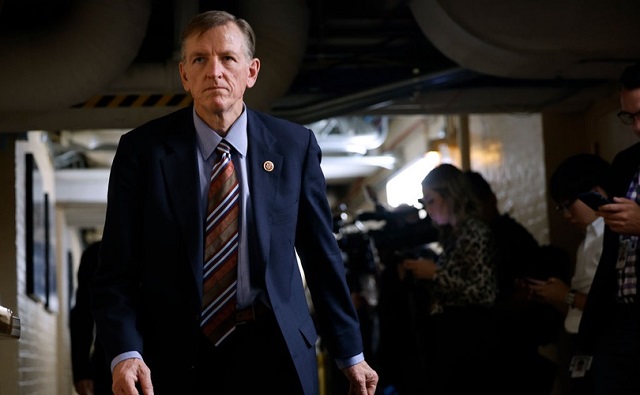International
Rep. Paul Gosar grills Biden official on government funding of underage ‘gender transitions’

U.S. Rep. Paul Gosar of Arizona.
From LifeSiteNews
“I thought the USA was better than that. I thought we were the leaders in science, not followers. I find it disgusting that you still sit there and hide behind that”
The federal government is funding underage “gender reassignment” procedures for the families of government employees and has no interest in keeping track of how many, according to a recent exchange between U.S. Rep. Paul Gosar (R-AZ) and Rob Shriver, acting director of the U.S. Office of Personnel Management (OPM).
During a hearing Tuesday of the House Oversight & Accountability Committee, Gosar pressed Shriver on the Federal Employees Health Benefits Program (FEHB) contracting with health plans that commit surgical and chemical “transition” procedures on children suffering from gender confusion – particularly at a time when the United Kingdom and other European governments are moving away from the practices in response to mounting evidence of their medical dangers that U.S. authorities continue to ignore.
Shriver responded that “the health plans that participate in the FEHB decide on the benefit packages that they make available,” claiming that his office had no authority over the specific benefits of FEHB plans. Gosar was incredulous that he was essentially “allowing a bad product to go forward here,” then noted that FEHB actually mandated coverage of “gender transitions” or “sex transformation” in a 2016 program carrier letter.
Citing restrictions on puberty blockers adopted in recent years by Denmark, England, Finland, Norway, and Sweden, the congressman lamented, “I thought the USA was better than that. I thought we were the leaders in science, not followers. I find it disgusting that you still sit there and hide behind that, when children are being mutilated.”
Shriver also deflected Gosar’s call for “greater transparency” and data collection on children being “transitioned” through FEHB health plans, noting that former OPM director Kiran Ahuja, who stepped down earlier this month for reported health and family issues, previously refused to mandate reporting on how many children receive the “services.”
Gosar previously introduced language to deny taxpayer funding to any FEHB plan that covered “gender transitions” in the most recent government appropriations package, but it was cut from the final version that was signed into law in March.
Contrary to the Biden administration’s pretense of acting in children’s best interests, a significant body of evidence shows that “affirming” gender confusion carries serious harms, especially when done with impressionable children who lack the mental development, emotional maturity, and life experience to consider the long-term ramifications of the decisions being pushed on them, or full knowledge about the long-term effects of life-altering, physically transformative, and often irreversible surgical and chemical procedures.
Studies find that more than 80% of children experiencing gender dysphoria outgrow it on their own by late adolescence, and that full “reassignment” surgery fails to resolve gender-confused individuals’ heightened tendency to engage in self-harm and suicide — and may even exacerbate it, including by reinforcing their confusion and neglecting the actual root causes of their mental strife.
The Biden administration’s own Substance Abuse & Mental Health Services Administration (SAMHSA) released a since-deleted report last year acknowledging that self-professed homosexual and bisexual adults “are more likely than straight adults to use substances, experience mental health conditions including major depressive episodes, and experience serious thoughts of suicide.”
Yet the White House continues to give uncompromising support to all major aspects of the LGBT agenda, including reopening the military to recruits afflicted with gender dysphoria, promoting gender ideology within the military (including “diversity” and drag events on military bases), holding White House events to “affirm transgender kids,” condemning state laws against underage “transitions” as “close to sinful,” promoting underage “transitions” (potentially at taxpayer expense) as a “best practice,” and trying to force federally funded schools to let males into female athletic competitions and restrooms.
International
Boris Johnson Urges Ukraine to Continue War

By Martin Armstrong
Trump’s proposal for peace in Ukraine has been met with an overwhelming condemnation from the world’s neocons. Former UK Prime Minister Boris Johnson reemerges from the shadows whenever he hears word that a war may be winding down. He played an instrumental role in persuading Zelensky not to negotiate a peace treaty with Russia when it was apparent that Ukraine could not easily win, and now, Johnson is urging Ukraine to continue the war.
“Imagine that you are Vladimir V. Putin and you are spending a calm Saturday in the Kremlin… You casually watch the television news, and you cannot help but smile at the incompetence of your opponents, at the astonishing weakness of the West. You have lost more than a million soldiers, killed and wounded, in your attempts to subdue Ukraine. You have still failed to capture more than 20 percent of the country’s territory. Your economy is faltering. And now they are talking about some new 28-point plan to end the war – and it could have been written entirely by the Kremlin,” Johnson warned.
In typical neocon fashion, Johnson wants to paint the proposal as a victory for Russia. He acknowledges millions have died, but since they are Russian, their lives do not matter. Continue the slaughter at the expense of the people.
Johnson declared that Britain was in a proxy war with Russia back in November 2024. “It has been pathetic… Let’s face it: We’re waging a proxy war but not giving our proxies the ability to do the job. For years now, we’ve been allowing them to fight with one hand tied behind their backs, and it has been cruel,” he admitted one year ago. Why would Britain feel threatened by Russia? Why would any sane leader thrust their people into a battle that is not theirs to fight?
The head of M16, Sir Richard Moore, also came out in November 2024, admitting British intelligence was discreetly fighting on behalf of Ukraine. “We cherish our heritage of covert action, which we keep alive today in helping Ukraine resist the Russian invasion,” Moore commented.
Moore and Johnson know that Russia has no incentive to invade Europe, especially Britian. There is absolutely nothing for Putin to gain. Europe, on the other hand, has everything to gain through conflict with Russia. They see Ukraine as the ultimate entryway into Russia
War is a great way to default on debts. You get to form a new government, and they always disavow the debts of the previous government. Europe has been committing economic suicide. Between the COVID-19 Lockdowns, the NET-ZERO Climate Change, and then the sanctions on Russia that doubled their fuel costs, you could not ask for a more brain-dead group of politicians who have ZERO comprehension of even how the economy functions.
Plain and simple—Russia invaded due to the West’s failure to honor the Minsk Agreement. The neocons disregard the proposal entirely and conveniently disregard the original signed agreement when discussing conceding territory.
“The document offers Ukrainians not only to give up any attempts to reclaim Crimea or Donbas, but also to cede vast territories, including about 250,000 Ukrainians whom the Russians do not even control. Of course, you knew your negotiators would try something like that. But you never believed anyone would take this seriously. You can’t believe that President Trump would back this plan, because it is a complete betrayal of Ukraine,” Johnson continued in his recent writing.
LET THE PEOPLE VOTE! The ethnically Russian people living in Ukraine have been unable to decide on their leadership. Zelensky outlawed their religion and language. Everyone believes they are protecting the people in these regions from the other side, but only one side is open to learning the people’s wishes. The 28-point plan saves the PEOPLE of both Russia and Ukraine. Russia cannot abandon the war without guarantees that NATO will back down and Ukraine is merely an EU puppet. Zelensky now has two days to decide whether he is willing to destroy his nation for the neocons.
Daily Caller
EXCLUSIVE: Here’s An Inside Look At The UN’s Disastrous Climate Conference


From the Daily Caller News Foundation
By Audrey Streb
The United Nations’ annual climate conference concluded Saturday, and some critics in attendance told the Daily Caller News Foundation that it was a chaotic affair.
After Thursday’s fire forced an evacuation and temporarily halted the talks, COP30 was prolonged by an extra day. Corporate media outlets and green groups critiqued the final agreement reached on Saturday, arguing that it did not do enough to restrict carbon emissions. The environmental groups claimed the resolution departed from COP28’s declaration which called for an end to fossil fuels.
Hosted in Belém, Brazil, COP30 provoked backlash after developers razed the Amazon rainforest ahead of the climate talks and China worked to seize the spotlight in America’s absence. Craig Rucker, co-founder and president of the conservative nonprofit known as the Committee for a Constructive Tomorrow,(CFACT) told the DCNF that this year’s UN climate talks were especially chaotic and disorganized.
Dear Readers:
As a nonprofit, we are dependent on the generosity of our readers.
Please consider making a small donation of any amount here.
Thank you!
“I’ve been to 27 of the 30 conferences. … What you see on the ground is just how chaotic it’s gotten. There was a certain chaos in the past, but this was particularly disorganized because they picked a venue that I think was unsuited for all the delegates that were coming in,” Rucker told the DCNF in an interview. “They wanted to emphasize the rainforest, yet hypocritically, they’re chopping them down to accommodate delegates flying in on private jets.”
The UN did not respond to the DCNF’S request for comment.
Rucker and Marc Morano, who publishes CFACT’s ClimateDepot.com, ventured into the Amazon rainforest to investigate the four-lane highway initially reported by BBC in March. Rucker told the DCNF that Brazil was “still cutting and burning. We heard the chainsaws ourselves, and this is something they [the Brazilian state] try to keep [quiet].”
The highway, known as Avenida Liberdade, was shelved multiple times in the past due to environmental concerns but revived as part of a broader push to modernize Belém ahead of COP30, according to the outlet. State officials say the development efforts will leave a lasting legacy, including an expanded airport, new hotels and an ungraded port to accommodate cruise ships.
The Brazilian state denied that the highway was built for the climate conference, noting that plans for the road were underway as early as 2020 — well before Brazil was selected to host COP30, Reuters reported in March.
President Donald Trump sharply criticized the conference for deforesting portions of the Amazon to ease travel for environmentalist attendees. The U.S. did not send an official delegation this year.
Democratic California Gov. Gavin Newsom and Democratic Rhode Island Sen. Sheldon Whitehouse attended the talks, where they denounced the Trump administration’s energy policies and absence.
A top United Nations official reportedly directed Brazilian authorities to address concerns including leaky light fixtures, sweltering heat and lackluster security at the conference, according to Bloomberg News. Days later, the fire broke out.
Morano also documented water pouring from vents, and Rucker told the DCNF that attendees were not allowed to flush toilet paper as the venue “didn’t have a septic system.”
Rucker also recalled what he described as elitism, noting that delegates were in the “blue zone” while other attendees and indigenous groups were relegated to the “green zone.”
“The blue zone is where the official delegates go, the people that are from Spain, Portugal, Brazil. … And these are the people that make the decisions,” Rucker said. “The indigenous people, they say, don’t have a voice allowed in there. That’s partially why they crashed it.”
Though COP30 did host several events featuring indigenous voices, some native groups stormed the COP30 venue the first week, demanding their voice be heard by the UN.
Rucker told the DCNF that China seemed to have become a “new leader” on the environmentalism and green energy front at the climate conference, though the oriental nation is “pumping out with two coal plants per week.”
Recent media reports have hailed China as a giant in building out “renewables,” though China is far from dependent on intermittent resources like solar and wind as it also churns out new coal plants and is the world’s top emitter.
“They genuinely looked at China as the world leader on climate change,” Rucker noted, branding it as “totally bizarre.”
Rucker recalled that upon the entrance of the “blue zone,” there was a “very impressive Chinese booth.”
Additionally, a statue demeaning Trump stood outside COP30, according to Reuters, as well as a horned jaguar-dragon hybrid statue with its hands gripping the globe. The fanged construction purportedly represented China and Brazil partnering to protect the rainforest.
“The statues are purely political statements: one symbolizes how communism is alive and well in Brazil and China, and the other is a misguided attempt to shame or critique Trump,” Director of the Arthur B. Robinson Center on Climate and Environmental Policy at The Heartland Institute Sterling Burnett told the DCNF. “Trump’s promotion of fossil-fuel development and broader use — especially encouraging developing countries to tap into affordable energy — will do more to help children in poor countries than all the climate agreements and green energy scams combined.”
-

 Alberta2 days ago
Alberta2 days agoPremier Smith explains how private clinics will be introduced in Alberta
-

 Business2 days ago
Business2 days agoUS Supreme Court may end ‘emergency’ tariffs, but that won’t stop the President
-

 International2 days ago
International2 days ago“The Largest Funder of Al-Shabaab Is the Minnesota Taxpayer”
-

 Alberta2 days ago
Alberta2 days agoAlberta introducing dual practice health care model to increase options and shorten wait times while promising protection for publicly funded services
-

 International2 days ago
International2 days ago50 of the 315 students and 12 staff abducted from Catholic school in Nigeria last week have escaped
-

 espionage2 days ago
espionage2 days agoSoros family has been working with State Department for 50 years, WikiLeaks shows
-

 Alberta2 days ago
Alberta2 days agoRed Deer’s Jason Stephan calls for citizen-led referendum on late-term abortion ban in Alberta
-

 Indigenous2 days ago
Indigenous2 days agoIndigenous activist wins landmark court ruling for financial transparency








